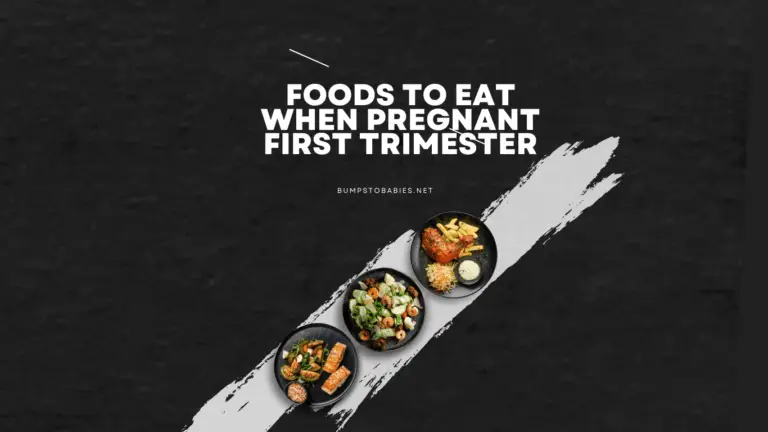Congratulations! Beginning the incredible journey of pregnancy is a life-changing experience. The first trimester can be an emotional whirlwind, making nourishing your body with the right foods crucial. This guide will help you understand the top foods to nourish your body during the first trimester of pregnancy that promote your health and support your baby’s development.
Why Proper Nutrition Matters
The first trimester is crucial for your baby’s development. Proper nutrition can help you:
- Support your baby’s rapid growth.
- Maintain your energy levels.
- Reduce symptoms like nausea and fatigue.
- Lay a foundation for a healthy pregnancy.
Essential Nutrients in the First Trimester
- Folic Acid
- Why it’s important: It helps prevent neural tube defects.
- Foods rich in folic acid: Leafy greens (spinach, kale), citrus fruits, beans, peas, and fortified cereals.
- Iron
- Why it’s essential: It supports increased blood volume and helps prevent anaemia.
- Foods rich in iron: Lean meats, spinach, legumes, and fortified grains.
- Calcium
- Why it’s essential: Supports the development of strong bones and teeth.
- Dairy products (milk, cheese, yoghurt), fortified plant milk, leafy greens, and almonds are among foods rich in calcium.
- Protein
- Why it’s essential: Promotes the growth of fetal tissues and organs.
- Protein-rich foods include lean meats, poultry, fish, eggs, tofu, nuts, and seeds.
- Vitamin D
- Why it’s essential: It aids in calcium absorption and supports bone health.
- Foods high in vitamin D, like salmon, fortified dairy products, and getting sunlight exposure.
Foods to Include in Your Diet
- Fruits and Vegetables
- Benefits: Packed with essential vitamins, minerals, and fibre.
- Examples: Berries, oranges, bananas, carrots, bell peppers, and leafy greens.
- Whole Grains
- Benefits: Provide sustained energy and are high in fibre.
- Examples: Oats, brown rice, whole wheat bread, and quinoa.
- Lean Proteins
- Benefits: Essential for muscle development and overall growth.
- Examples: Chicken, turkey, beans, lentils, and fish (low in mercury).
- Dairy or Dairy Alternatives
- Benefits: This excellent source gives you daily calcium and vitamin D.
- Examples: Milk, cheese, yoghurt, fortified almond, and fortified soy milk.
- Healthy Fats
- Benefits: Important for brain development and energy.
- Examples: Avocados, nuts, seeds, olive oil, and fatty fish.
Foods to Avoid
- High-Mercury Fish
- Examples: Shark, swordfish, king mackerel, and tilefish.
- Undercooked or Raw Seafood and Meat
- Examples: Sushi, raw oysters, and rare or medium-rare meats.
- Unpasteurized Dairy Products
- Examples: Certain soft cheeses like Brie, Camembert, and blue cheese.
- Caffeine
- Limit intake: Aim for no more than 200 milligrams daily (about one 12-ounce cup of coffee).
- Alcohol
- Recommendation: Completely avoid alcohol to prevent fetal alcohol syndrome.
Tips for Managing Nausea
- Eat small, frequent meals: Keeps your stomach from being empty and reduces nausea.
- Stay hydrated: Sip water throughout the day.
- Avoid trigger foods: Common triggers include spicy and greasy foods.
- Ginger: Ginger tea or ginger candies can help alleviate nausea.
Conclusion
Eating a well-balanced and nutritious diet during your first trimester is crucial for your health and your baby’s development. By including various nutrient-rich foods and avoiding harmful ones, you can ensure a healthy start to your pregnancy.
If you have specific dietary concerns or limits, It’s good to consult a healthcare professional or a registered dietitian to adjust your diet to fit your needs.
Stay healthy and enjoy this beautiful journey!
Join Our Community!
Are you seeking support, advice, or just a friendly chat about pregnancy and parenting? Join our community on Facebook! Connect with other parents, share your experiences, and get answers to all your questions.
For more articles and resources on pregnancy, be sure to check out our comprehensive guides on our website. You’ll find a wealth of information to help you on your journey from bumps to babies.
Additional Resources
- Healthy Eating During Pregnancy: For more tips on maintaining a nutritious diet during pregnancy, visit the American Pregnancy Association for reliable information and meal suggestions.
- Exercise and Pregnancy: Staying active during pregnancy has multiple benefits. Check out ACOG’s Guidelines for exercise recommendations tailored to each stage of pregnancy.
- Mental Health Support: Mental well-being is as important as physical health during pregnancy. Visit Postpartum Support International for resources and support services.


Comments are closed.